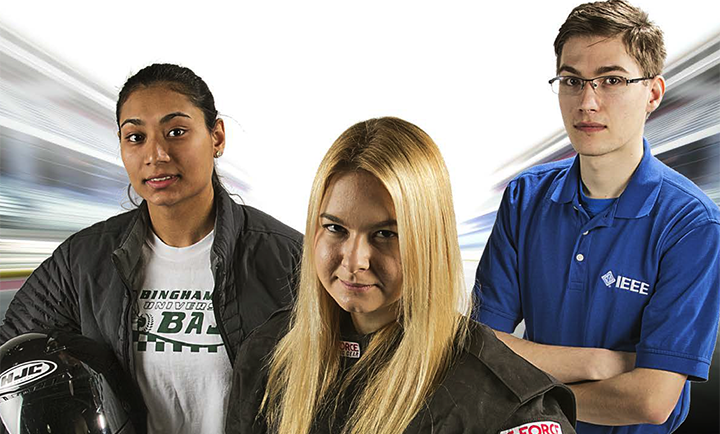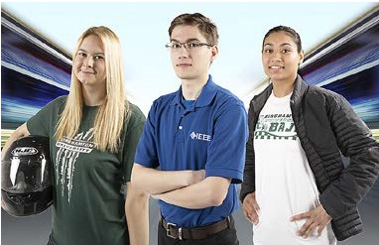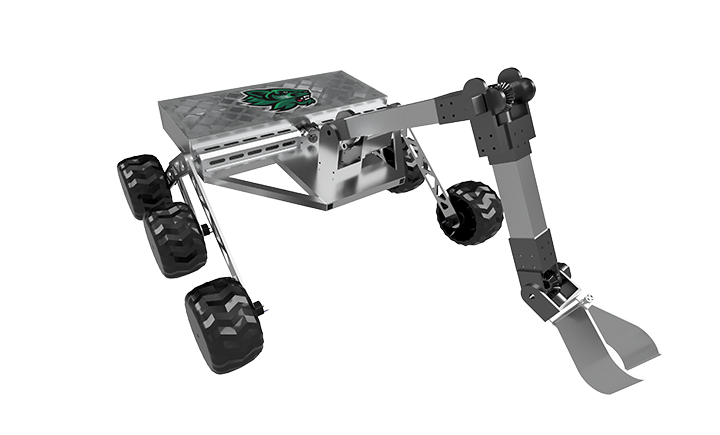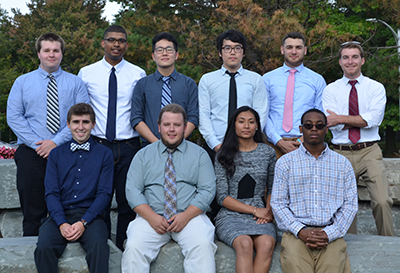Races, spaces and trophy cases
Dynamic competitions. Practical skills.

There’s only so much you can learn from a textbook or a whiteboard. Students in the Watson School have found that to be especially true.
Engineers need to take things apart and put them back together. They need to test things and constantly improve on them. That often means working with people in different disciplines to make something together.
In 2017, the Watson School created a program called “Watson Competes!” that encapsulates all the different ways students have been gaining the practical skills they need with the added bonus of fun competitions, friendships and even a few awards.
Innovating and levitating
One example of this cross-disciplinary, hands-on experience is the Binghamton Hyperloop team which is now in its third year. A Hyperloop is a mode of transportation where a pod travels in a tube similar to the pneumatic tubes at a bank drive-through.
“The first year, the team was so new and trying to really get a handle on things,” says senior industrial and systems engineering major Kasey Hill, who is a project manager for the team. “Last year’s team made it all the way to the SpaceX competition in California, so now we know what to expect and are working harder than ever to really advance our pod.”
The team has been working on a levitation system that they think will help them get closer to the grand prize this summer. Senior electrical engineering major Anthony Dorsa worked on the electrical system in last year’s Hyperloop pod and is in charge of this year’s levitation system.
“We want to really stand out. Last year’s winning team used wheels, and we figured most teams would try to copy that strategy, so we went with a levitation system instead,” Dorsa explains. “Plus, it’s more in the spirit of what a real Hyperloop pod would do. Wheels would just burn out at those high speeds, so they aren’t practical.”
Colonizing Mars
If people really do colonize Mars, they might just need a robotic friend to help explore and set up outposts.
The brand-new Binghamton University Mars Rover Team is ready for that challenge.
The team is building a rover that can survive harsh conditions on Mars and also drive itself to compass points without any support, pour out a bucket of water and keep in contact with the home base.
The rover will go up against the designs of other schools as part of the Mars Society’s annual competition.
The team, made up of more than 60 students from all of the Watson School departments as well as geology and biology, is managed by the Binghamton University student chapter of the Institute of Electrical and Electronics Engineers (IEEE).
Sam Stone, president of the chapter, says that a variety of sub-teams gives students plenty of options to match their interests.
“We have seven different subteams focusing on things that range from software to communications, mechanical to electrical,” Stone says. “Within each of those subteams, there are even more opportunities for students to specialize in a certain part of the rover. The team has something for everyone.”
Building a legacy
While the Binghamton Hyperloop team and the Binghamton University Mars Rover Team are relatively new, the Society of Automotive Engineers (SAE) has been a staple for Watson School students.
The Binghamton SAE is the organizing body that coordinates a variety of competitions including the Formula Hybrid, Baja and Supermileage cars.
“In the past, students from all majors, including business and marketing, were active members in the club. Today, the organization mainly consists of Watson students, so SAE is looking to once again attract students from all majors,” says Jacob Honsinger, the vice president of Binghamton’s SAE chapter. “It really operates more like an automotive business, where we have people helping us find sponsors, others who are promoting what we do and then, of course, the engineers and computer scientists building the cars.”
Honsinger, a junior, says that most of the cars are senior capstone projects. He wants to increase the role that younger students play in the organization with the idea that a younger group of SAE members will translate to a more competitive program in the future.
“If we just have seniors in the group, there’s no one to carry on the legacy or learn from last year’s mistakes,” he says. “Our underclassmen go-kart project this year is serving as an entry-level project for students to get hands-on experience before working on bigger projects. In the future, we are planning to increase the complexity and scope of these projects.”
Learning on a smaller project can help prepare students to work on something like the Formula Hybrid.
Anna Domagala is a senior engineering major and the team captain for this year’s Formula Hybrid — the newest car in the SAE lineup.
“One big difference this year is that we’re actually fabricating our own battery,” she says. “It’s a huge challenge, but we have graduate students working on it with us and that helps us all learn a bit more.”
Unlike some other teams, the Formula Hybrid team has quite a few graduate students assisting with production this year.
Rob Dean ’17 worked on the Formula Hybrid when he was a senior, and now that he’s a master’s student, he’s continuing to assist with the production.
“We’d love to make it more common for alumni to return to help with the project or mentor the team,” Dean says. “It helps the team understand why something was done a certain way the year before so they don’t start from scratch each year.”
The Baja car team is facing exactly that problem. Fatima Shamsuddin, Baja team captain and a senior mechanical engineering student, says this year’s team is mostly new to SAE.
“We’re a really diverse team, which is amazing because it’s not often what you picture for a Baja team, but we’re mostly all new. We know a lot of the theoretical stuff, but we’ve been asking around to find out more about terminology or to get feedback,” she says.
All the Watson Competes! programs afford students a chance to be involved in something outside the classroom and to hopefully build upon the collective knowledge
of those who came before and those who come from different disciplines.
A theme across all the competitions is the constant drive to imagine something better than what has come before.
As Kasey Hill of the Hyperloop team says, “We’re competing against some really big schools. We might not be able to out-money them, but what we can do is out-dream them.”



